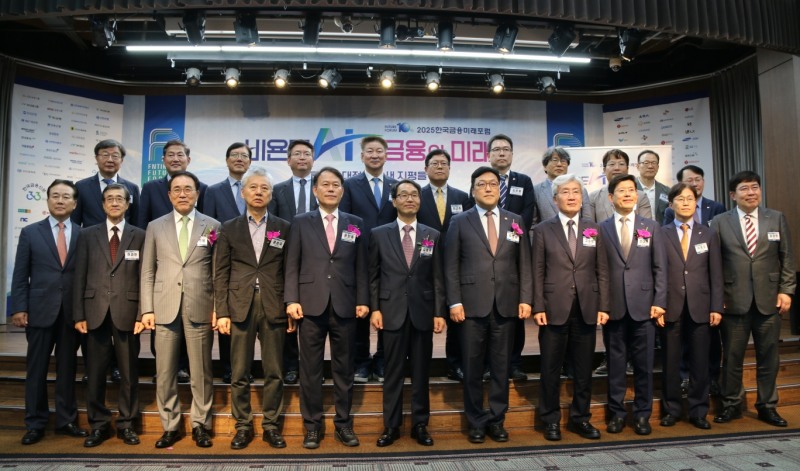 이미지 확대보기
이미지 확대보기This was the message from Kim Bong-kook, CEO of Korea Financial Times, the organizer of the 2025 Korea Financial Future Forum.
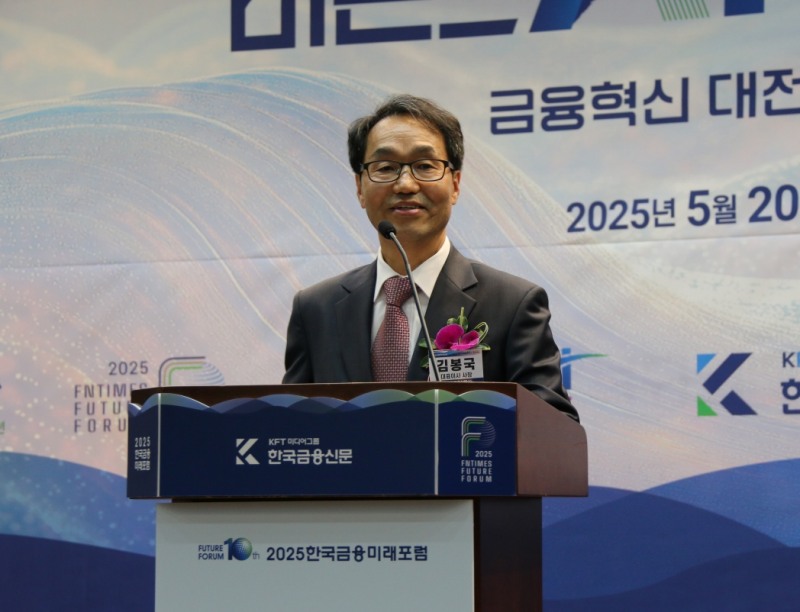 이미지 확대보기
이미지 확대보기On May 20, Korea Financial Times hosted the 2025 Korea Financial Future Forum, providing a platform for discussions on AI trends and response strategies in the era of AI transformation.
The event, held at 2:00 p.m. at the International Conference Room of the Korea Federation of Banks in Myeong-dong, Jung-gu, was attended by Yoon Han-hong, Chairman of the National Assembly’s Political Affairs Committee; Hong Seong-guk, Supreme Council Member of the Democratic Party of Korea; Kim Byeong-hwan, Chairman of the Financial Services Commission; and CEOs at the forefront of Korea’s financial and fintech industries, including Cho Yong-byeong, Chairman of the Korea Federation of Banks.
◇ "AI Will Determine National Competitiveness"… "Financial Sector Should Lead AI Applications"
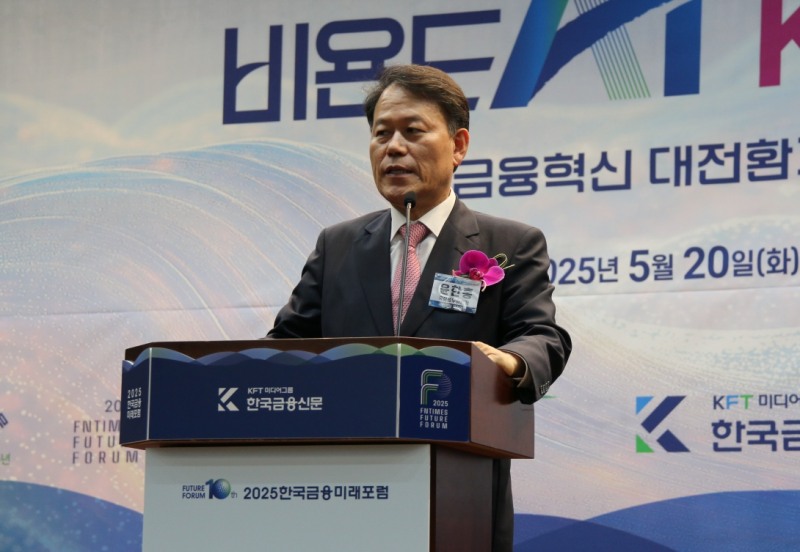 이미지 확대보기
이미지 확대보기Key figures from the political and financial sectors at the forum unanimously emphasized the need to closely monitor the flow of financial AI and respond to changes.
Yoon Han-hong, Chairman of the Political Affairs Committee, stressed, "AI has now become a strategic weapon that determines the competitiveness of nations and industries, going beyond a mere technology."
He continued, "If those in the field provide various ideas for financial AI, the government will fully reflect them by easing regulations and providing policy support," expressing his commitment to strengthening AI competitiveness.
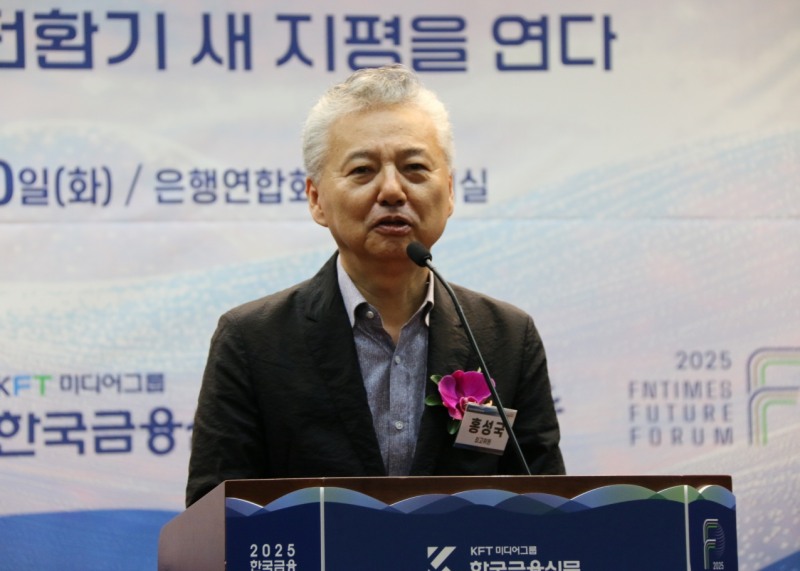 이미지 확대보기
이미지 확대보기Hong Seong-guk, Supreme Council Member of the Democratic Party of Korea, also emphasized the necessity of strengthening AI capabilities.
Hong explained, "The importance of AI is so great that the next government, which will soon be inaugurated, cannot help but address Korea’s AI transformation."
He stated, "Some say that Korea’s AI is lagging behind that of other countries, but I believe such concerns will actually serve as a driving force to foster even greater AI growth," adding, "I hope the financial sector will take the initiative so that AI can be applied in everyday life."
◇ "Financial AI Should Be Customer-Oriented… Investment by Financial Institutions Is Necessary"
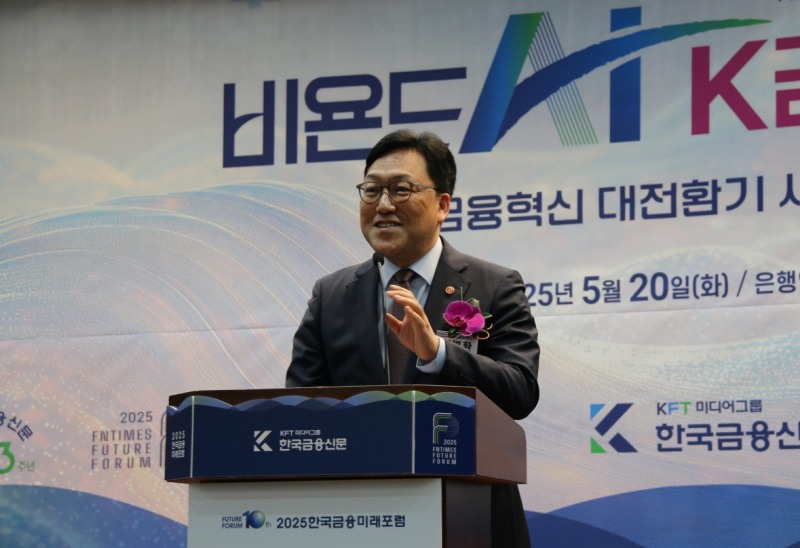 이미지 확대보기
이미지 확대보기Kim Byeong-hwan, Chairman of the Financial Services Commission, presented his vision for the development of financial AI.
He stated, "I believe that the AI now being actively introduced in the financial sector should be customer-oriented," adding, "I trust that AI will enable us to provide better services to our customers."
Since announcing the "Roadmap for Improving Network Separation in the Financial Sector" in August 2024, the Financial Services Commission has actively supported the use of generative AI and, through regulatory sandboxes, has permitted approximately 70 innovative services from 46 financial companies to date.
Chairman Kim emphasized the need for financial companies to invest further to enhance the competitiveness of financial AI.
He said, "Going forward, financial companies must focus more on developing better services, including those that protect customers," adding, "Investment is needed for this."
Chairman Kim explained that this investment should not only be in financial assets but also in talent for strengthening R&D, as well as in security and consumer protection.
He also mentioned the importance of using AI to strengthen inclusive finance in financial institutions.
He stated, "The most important function of the financial industry is to act as an intermediary to use funds more productively and efficiently," adding, "Financial companies should leverage AI to better fulfill their intermediary role for small business owners and ordinary citizens."
◇ AI Agents : Essential for "Pro-active Finance"
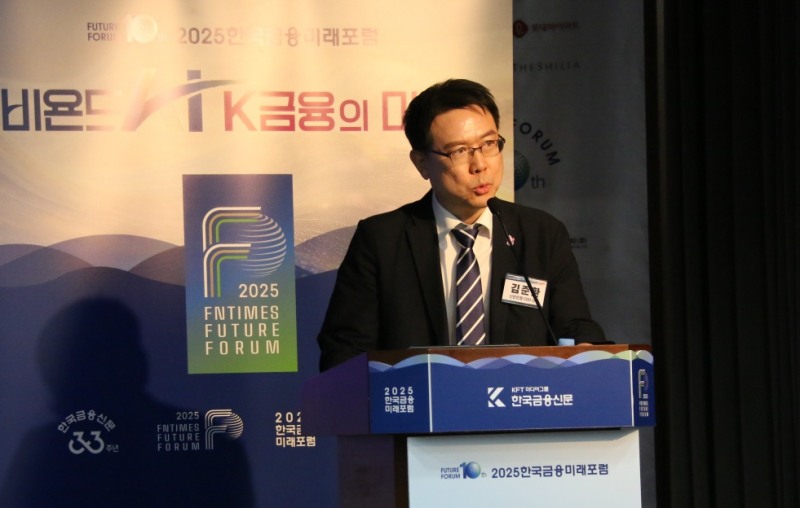 이미지 확대보기
이미지 확대보기The forum featured a lecture on "AI Agents," a key issue in the AI transformation era.
The speaker, Kim Jun-hwan, Head of Digital Part at Shinhan Financial Group, is an AI and big data expert who has served as a visiting researcher at the National Institute of Standards and Technology (NIST), a principal engineer at Samsung Electronics Global Technology Center, and an executive director at SK C&C Platform1 Group.
Kim explained, "If traditional AI (LLM, generative AI) is the brain, then AI Agents add body parts such as arms and legs to that brain."
AI Agents have evolved beyond simply answering questions and executing input commands to autonomously identifying and solving problems.
For example, while traditional AI would provide route and time information when a destination is entered for travel, an AI Agent can also offer information on what to prepare for the trip and details about the destination.
Applying AI Agents to actual business operations is expected to greatly improve efficiency.
For instance, when a business department requests additional staff, a recruiter previously handled everything from job analysis to posting job ads, screening applications, conducting interviews, and negotiating employment. With AI Agents, assistance can be provided throughout the process, from job analysis and job ad creation to candidate filtering.
Kim Jun-hwan suggested that, to respond to the era of AI transformation, it is necessary to focus on core values that do not change.
He emphasized the importance of distinguishing between what AI can do and what humans can do, leveraging each other's strengths.
Kim particularly highlighted the significance of AI Agent utilization in the financial sector, explaining, "Finance involves many step-by-step actions, such as logging in, checking amounts, authentication, and completion, and execution is more important than simple responses."
He predicted that AI Agents will play a key role in the evolution toward "Pro-active Finance," where financial services are proactively proposed and executed based on a customer’s situation and context.
Kim cited Shinhan Financial Group’s super app "Super SOL" and Shinhan Bank’s AI branch as examples.
Through the app, Shinhan Financial Group is preparing to provide financial briefings during the morning commute, budget notifications based on spending patterns, and even loan repayment schedules or new investment opportunities via voice commands.
At the AI Branch, AI bankers interact directly with customers, handling a total of 22 tasks, achieving a 50% reduction in simple task processing and a 60% customer completion rate.
◇ "Sandbox Utilization Should Be Increased to Strengthen AI and Fintech"
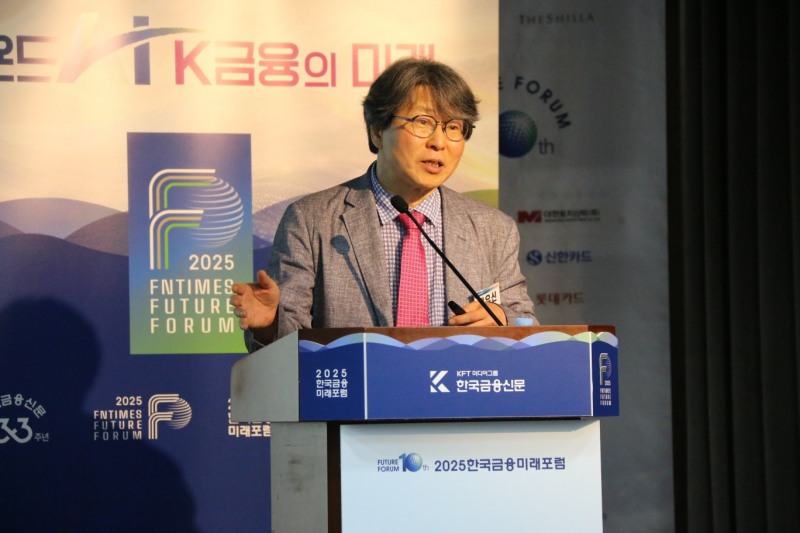 이미지 확대보기
이미지 확대보기A presentation on the new phase of fintech followed.
Jung Yoo-shin, Professor at Sogang University Graduate School of Business, gave a presentation on "Fintech Innovation 3.0," emphasizing, "It is now time to shift from digital finance to tech finance."
He explained, "As cross-border digital transactions and the spread of AI accelerate globalization, K-Finance should actively utilize and integrate core infrastructure technologies such as AI and blockchain."
Professor Jung believes that the emergence of generative AI has ushered in a new era of "Fintech 3.0 Innovation," distinct from previous fintech innovations.
In the era of Fintech 3.0, finance is expected to evolve into tech-finance as it converges with infrastructure such as AI, positioning fintech companies to emerge as leaders of innovation.
He stated, "Financial payment data contains information on the behavior of all industrial companies and consumers, so by using financial data as a medium to create synergy with other industries, fintech can lead innovation."
For the further growth of fintech in Korea, Professor Jung proposed the "Beyond Sandbox" approach.
He pointed out, "Most innovative financial services are centered on financial companies, so designating fintech companies’ innovative financial services has been limited," and emphasized, "To maximize the 'catfish effect' of fintech companies in finance, the government should operate the newly established 'Beyond SANDBOX' system more proactively."
He also mentioned the need to establish an investment ecosystem for fintech companies.
He suggested, "An investment ecosystem should be established for each growth stage, especially by introducing fintech angel investment funds and fintech accelerator systems for the early stages where profit models are uncertain."
◇ "Retirement Pensions: From Savings to Investment with AI"
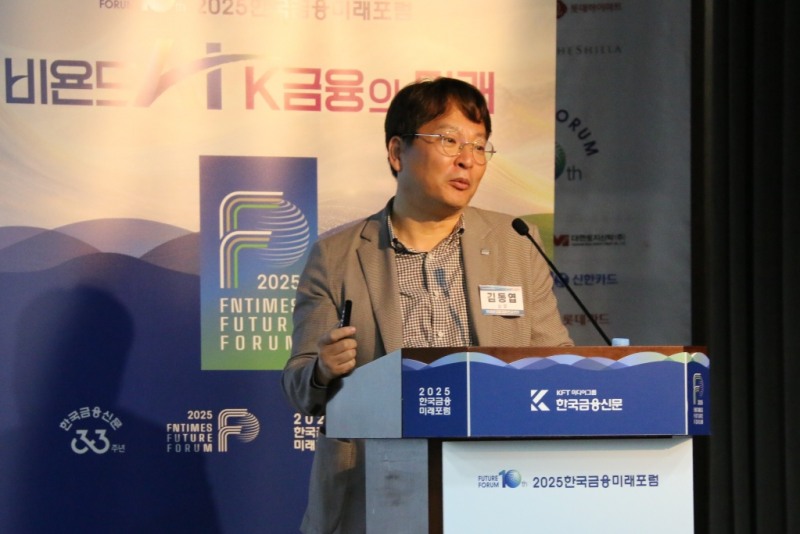 이미지 확대보기
이미지 확대보기A lecture was also given on the use of AI in the pension sector, which is gaining more attention as Korea enters an aging society.
Kim Dong-yeop, Executive Director of Mirae Asset Investment and Pension Center, emphasized the necessity of comprehensive AI-based pension asset management, predicting, "AI will improve pension returns and enable comprehensive management of pension assets."
A representative case is the robo-advisor discretionary investment service for retirement pensions.
To increase the returns of retirement pensions heavily concentrated in principal-guaranteed products, the Financial Services Commission designated the robo-advisor discretionary service for retirement pensions, applied for by 17 discretionary investment companies in December 2024, as an innovative financial service.
The robo-advisor discretionary investment service automatically generates customized portfolios according to investors’ risk profiles using verified algorithms and manages IRP (Individual Retirement Pension) contributions accordingly.
The robo-advisor of the discretionary investment company directs the operation on behalf of subscribers, automatically managing retirement pensions.
Kim Dong-yeop predicted, "Robo-advisors for retirement pensions will contribute to improving returns and securing post-retirement income for workers, and in the long term, will expand performance-based product investments among IRP subscribers."
◇ "Financial Authorities to Support AI Utilization with Fast-Track Procedures"
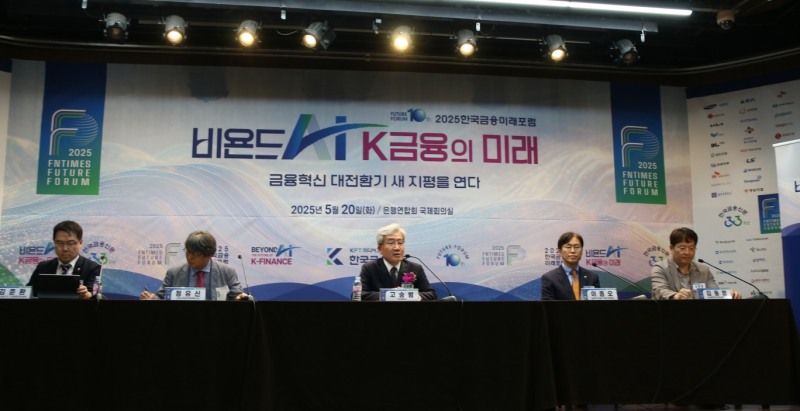 이미지 확대보기
이미지 확대보기The forum concluded with a panel discussion on "Directions for Financial Innovation in the AI Era," moderated by Koh Seung-beom, former Chairman of the Financial Services Commission.
Panelists included Kim Jun-hwan, Head of Digital Part at Shinhan Financial Group; Jung Yoo-shin, Professor at Sogang University Graduate School of Business; Kim Dong-yeop, Executive Director of Mirae Asset Investment and Pension Center; and Lee Jong-oh, Deputy Senior Director of Digital and IT Affairs at the Financial Supervisory Service, who discussed the future of financial AI in depth.
Lee Jong-oh noted, "Difficulties in the financial sector regarding AI include delays in the review of innovative services and the securing of AI infrastructure and data," adding, "Financial authorities are working to vitalize generative AI by improving network separation regulations, expanding AI infrastructure and data in the financial sector, and establishing an AI regulatory system suitable for AI-specific risks."
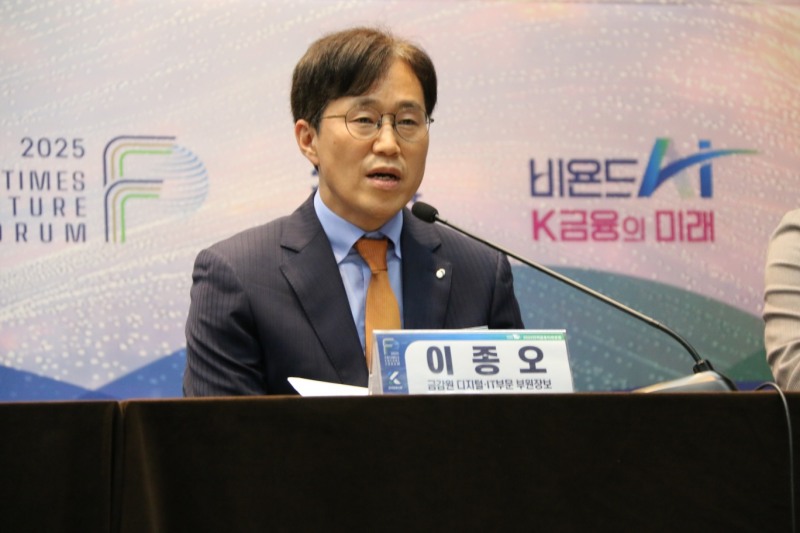 이미지 확대보기
이미지 확대보기Deputy Senior Director Lee explained, “Specifically, we plan to establish a fast-track process to accelerate approvals in cases where the structure is similar to that of generative AI,” adding, “We will also allow prior consultations to determine fast-track eligibility and address any deficiencies in advance.”
Kim Jun-hwan, Executive Director (CDO) of Shinhan Financial Group, projected that AI utilization will not reduce jobs but rather help create more employment.
He said, "If AI Agents are fully introduced, there will be many more jobs at headquarters and branches, and the range of tasks one person can handle will be greatly expanded," adding, "Increased productivity can also lead to a virtuous cycle of new employment."
A positive outlook was also presented regarding the expansion of robo-advisors using AI.
Kim Dong-yeop, Executive Director of Mirae Asset Investment and Pension Center, said, "In situations where workers lack investment experience and capability but must manage retirement pensions, it is difficult for PBs to provide individual consultations," adding, "If services like robo-advisors become more active and accessible, it will be much more convenient for customers to manage their assets."
Kim Seonghoon, Korea Financial Times (voicer@fntimes.com)
가장 핫한 경제 소식! 한국금융신문의 ‘추천뉴스’를 받아보세요~
데일리 금융경제뉴스 Copyright ⓒ 한국금융신문 & FNTIMES.com
저작권법에 의거 상업적 목적의 무단 전재, 복사, 배포 금지















![Tesla's Humanoid Rival Has Arrived — Boston Dynamics Eyes $70 Billion Valuation [K-Humanoid Wars, Part 1]](https://cfnimage.commutil.kr/phpwas/restmb_setimgmake.php?pp=006&w=284&h=214&m=5&simg=2026022010243207659141825007d12411124362.jpg&nmt=18)

![Samsung's 'Last Chance': Lee Jae-yong Pushes HBM4 as Make-or-Break Moment [KFT Topic]](https://cfnimage.commutil.kr/phpwas/restmb_setimgmake.php?pp=006&w=284&h=214&m=5&simg=2026012623242806011141825007d122461258.jpg&nmt=18)
![Hanwha Aerospace Stock Surges 3,500% in Six Years on 'Extraordinary Strength' [KFT Topic]](https://cfnimage.commutil.kr/phpwas/restmb_setimgmake.php?pp=006&w=284&h=214&m=5&simg=2026012609443900770141825007d12411124362.jpg&nmt=18)
![Tesla's Humanoid Rival Has Arrived — Boston Dynamics Eyes $70 Billion Valuation [K-Humanoid Wars, Part 1]](https://cfnimage.commutil.kr/phpwas/restmb_setimgmake.php?pp=006&w=110&h=79&m=5&simg=2026022010243207659141825007d12411124362.jpg&nmt=18)


!['Samsung's Bet on the Future' — Rainbow Robotics, Korea's Humanoid Pioneer [K-Humanoid Wars, Part 2]](https://cfnimage.commutil.kr/phpwas/restmb_setimgmake.php?pp=006&w=110&h=79&m=5&simg=2026022413501808272141825007d12411124362.jpg&nmt=18)
